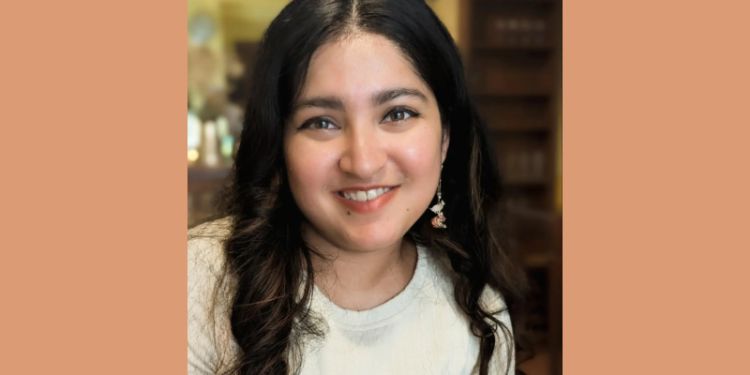World Food Day Spotlight: Dr Richa Yeshvekar

Dr Richa Yeshvekar is a Postdoctoral Research Associate in the School of Biology. Her research focuses on plant cell biology, genetics, and crop improvement.
Growing up in Maharashtra, India, Richa witnessed firsthand how poor harvests impacted local communities. Here, she explains how this experience has motivated amd inspired her work on crop resilience.
What are your main areas of research focus?
My focus is on understanding how plants build and remodel their tissues during development and in response to environmental stress. I study the plant cell wall, including its structure, composition, and mechanical properties, and how it influences communication between cells, growth patterns, and defence mechanisms.
To explore these questions, I use advanced imaging tools such as confocal, atomic force, and electron microscopy, along with molecular techniques. I investigate how specific wall components, including the polymer callose, regulate intercellular signalling and help plants adapt to stress. My research includes both model plants and crops such as Arabidopsis, tomato, strawberry, millets, and pigeonpea. This allows me to connect fundamental discoveries in plant biology with practical applications in agriculture.
What are the main drivers behind your research?
My research is driven by a deep curiosity about how plants adapt to their environments and a strong commitment to solving agricultural challenges in the face of climate change.
I grew up in Maharashtra, India, where smallholder farming plays a central role in both the economy and everyday life. Even from an urban setting, I saw how drought, disease, and poor harvests could disrupt entire communities, affecting livelihoods, education, and opportunity.
These early experiences gave me a clear sense of purpose: to use science to strengthen the resilience of crops and the people who rely on them.
My work focuses on how plants sense, communicate, and adapt at the cellular level. Unlike animals, plants cannot move away from stress. Instead, they reorganise their internal structures and reprogram their defences. By understanding these processes, we can find new ways to improve stress tolerance, disease resistance, and productivity in crops.
What are you working on at the moment?
I am currently working on the PDWallMech project, which is led by Professor Yoselin Benitez-Alfonso and funded by UK Research and Innovation through her Future Leader Fellowship.
This project investigates how the microscopic channels that connect plant cells, known as plasmodesmata, and the mechanical properties of the surrounding cell walls influence plant growth, communication, and development. My focus is on the cell wall polymer callose, which plays a key role in regulating how permeable and flexible these channels are.
Our recent research has shown that callose helps shape the mechanical properties of cell walls in tomato fruit, influencing how the fruit develops. We have also identified important molecular regulators, including β-glucanase genes, that control callose levels and appear to affect fruit size, texture, and resistance to disease.
In the current phase of the project, we are working with academic and industry partners such as NIAB, the Sainsbury Laboratory Cambridge University, Angus Soft Fruit, and Futamura. Together, we aim to translate our discoveries into practical solutions for crop improvement and sustainable agriculture. By linking cellular mechanics with plant development and stress responses, this work supports the creation of fruit crops that are more resilient, higher in quality, and better suited to future environmental conditions.
What is your vision for a sustainable or equitable food future?
A sustainable food future is one where scientific innovation and social inclusion move forward together.
The future of food depends not only on developing resilient crops, but also on ensuring that the benefits of research reach those who need them most. This includes smallholder farmers and women, who are often the backbone of food production in many parts of the world.
Sustainability begins at the level of the plant. By understanding how plants grow, tolerate stress, and use resources efficiently, we can design crops that are better suited to a changing climate. But sustainability must also extend beyond the laboratory, into the fields, supply chains, and communities that support our food systems.
How does your work connect to this year’s World Food Day theme, ‘Hand in Hand for Better Foods and a Better Future’?
My research reflects the spirit of ‘Hand in Hand’ by bringing together people, disciplines, and countries to address shared challenges in food security. For example, through different partnerships I am helping to connect research in the United Kingdom with agricultural challenges in the Global South. I help to translate discoveries in plant cell biology, such as how cell wall structure affects fruit quality or disease resistance, into real-world improvements in crops and food systems.
For me, working hand in hand means bridging scales, from the molecular to the societal, and making sure that innovation serves people and the planet.
What one change do we need to make for a better food future?
One essential change would be to ensure that nutritious food is accessible to everyone, regardless of geography, income, or social status. Food is a basic human right, yet millions of people still face hunger, malnutrition, or limited access to healthy options.
Making food truly accessible means more than just increasing production. It means rethinking how we grow, distribute, and value food. It also means investing in local food systems, supporting smallholder farmers, and removing barriers that prevent communities from accessing what they need to thrive.
As a scientist, I believe research needs to serve this goal. Whether through developing resilient crops, reducing post-harvest losses, or improving supply chains, every innovation should move us closer to a food system that is not only productive, but also just and inclusive.
Connect with Dr Richa Yeshvekar on LinkedIn.
Further information
Top image: Richa Yeshvekar.




